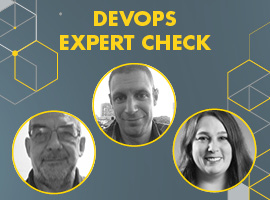- Program
- Program
- Program
- Program
- Program
- Call For Papers
- Program
- Program
- Tickets
- Tickets
- Tickets
- Bootcamps
- Tickets
- Tickets
- Tickets
- Tickets
- Program
- Formate
- Inhouse
- Blog
- Info
- DevOpsCon
- Downloads
- Sponsors & Expo
- Sponsors & Expo
- Info
- Camps
- Editions
- Jetzt anmelden
- Register Now
- Register Now
- Register now
- Register Now
- Register now
- Register now
- Register Now
Enjoying the content?
Get the most out of DevOpsCon by becoming a free community member — curated resources, weekly newsletter, and member-only perks.
The reads you'd find if you had time
Experts you can actually ask
Deep dives worth your weekend
Past conferences, ready when you are
Explore other Tracks
Business & Company Culture
Navigate the Human Side of DevOps.
Cloud Platforms
Scale Your Cloud Apps with Terraform, Serverless & beyond.
DevSecOps & Cloud Security
Secure DevOps from code to cloud with shift-left practices and AI.
Containerization & the Kubernetes ecosystem
Kubernetes: from fundamentals to advanced edge deployments.
Continuous Integration & Continuous Delivery
Automate Your Processes: Build High-Performance CI/CD Pipelines.
System Design & Software Architecture
Build scalable microservices with cutting-edge tools and patterns.
Observability & Service Mesh
Discover how tools like Grafana, Cilium, and OpenTelemetry can transform app data.
Stay ahead in DevOps, Kubernetes and CI/CD – without the doomscrolling.
Curated articles, deep dives, and live experts. Delivered, not hunted.
Stay ahead in DevOps, Kubernetes and CI/CD – without the doomscrolling.
Curated articles, deep dives, and live experts. Delivered, not hunted.









